High-octane fuel isn’t for every engine.
Some engines need it – but others do not.
Millions of other engines.
Feeding those engines high-octane fuel is a money-waster. High-octane “premium” fuel (which isn’t necessarily of higher quality, just higher octane; more about this in a moment) generally costs about 30-50 cents or more per gallon. If your car’s engine doesn’t require it, you’re spending several dollars more for every tankful – which can amount to several hundred dollars annually – and several thousand dollars over the 10-15 year lifespan of a new car. 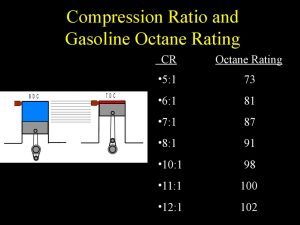
It’s also a power and mileage waster in cars that don’t need it. Many people do not grok this, but an engine not designed to burn high-octane fuel actually runs better (more efficiently) on lower octane fuel.
Because the fuel burns at the right moment. Not too soon – or too late.
That’s all octane is, really. A measure of a given fuel’s tendency to combust when subjected to increasing heat and pressure.
Some engines – generally, high-compression engines (this includes turbocharged and supercharged engines) – need a fuel that won’t burn too soon, as the result of high pressure and heat inside the engine’s cylinders – before the spark plug fires.
Which will resist combustion until the piston’s at just the right point in its travel – and not until the ignition system fires the spark plug.
High octane fuel fits that bill.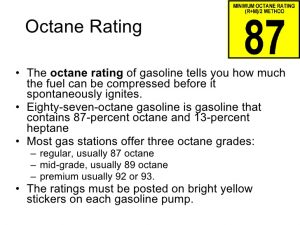
Other engines don’t have high cylinder pressure (comparatively) and so don’t need high-octane gas that is more resistant to spontaneously combusting due to high heat/pressure. They need fuel that burns more readily at lower pressures/heat.
Lower octane gas fits that bill.
This is why there is currently the option to choose the fuel with the right octane rating for your particular car’s engine. High-octane “premium” – generally, unleaded gasoline with an octane rating of 90 or more. And “regular” – generally, unleaded gasoline with an octane rating of 87 or so.
What if that choice were taken away? What if you had to pump the wrong octane fuel into your car’s tank?
Were effectively forced to pay extra for the fuel – as well down the road, in the form of lower mileage?
And very possibly, shorter engine life.
There’s a movement afoot whose object is precisely that – to make high-octane (95 octane) fuel the only fuel generally available. General Motors, in particular, is hard-selling the idea – touting it as a way to increase the power and fuel economy of new cars. Which it would . . . assuming all new car engines are designed to burn high-octane fuel.
But what about the millions of cars still on the road powered by engines not designed for it?
They, apparently, do not matter.
They’ll suffer mileage (and power) reductions. Or rather, their owners will suffer them. People who thought they’d save 30-50 cents per gallon on gas by purchasing a car that doesn’t need high-octane gas will be in for what might as well be a major tax hike on the cost of fueling their cars.
The proposal to make all gas high-octane gas will also help attrite those cars off the road, because in all probability, more ethanol will be added to gas. And those cars are not designed for that, either.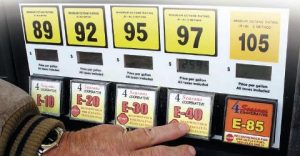
This is not being talked about much in news coverage of the proposal.
It ought to be.
First, a little background:
Almost all unleaded gas sold in the United States is already 10 percent ethanol (“E10”).
This is not a market-driven thing. It is a mandate-imposed thing. In the name of “encouraging” (that is, forcing) people to use more “renewable” fuels, the government created a an artificial market for ethanol – which is certainly “renewable,” but also other not-so-great things, including less energy dense and more expensive than gasoline. It’s also more corrosive and it attracts moisture, not good things for machinery.
But it’s very profitable for the big agribusiness cartels which produce the stuff – because we’re forced to buy it.
Soon, we may be forced to buy more of it.
Because ethanol – in addition to being “renewable” – is also used as an octane enhancer. If the government mandates 95 octane fuel as the new mandatory minimum octane fuel generally available, it will therefore likely mean more ethanol in our gas.
Possibly, E15 – “gas” that is 15 percent ethanol. Maybe more than that.
This won’t be an issue for new car engines designed for the higher octane – and for the higher ethanol content.
But it will be Bad News for any engine not designed for either thing, especially the higher ethanol content.
The reason the ethanol content of mainstream “gas” has so far been limited to 10 percent is because higher ethanol content will damage engines (and fuel storage/delivery systems) not specifically designed to handle it. The stuff accelerates rusting of gas tanks and fuel lines and can damage rubber seals and gaskets not designed to withstand it – the latter potentially leading to fuel leaks and fires.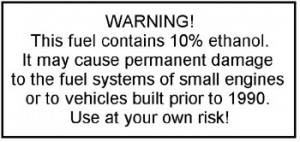
Most cars built since the ’90s can safely use E10; but older cars (and power equipment) sometimes have trouble because of it. Their engines – which don’t have computer-controlled fuel injection systems – can’t adjust for the leaner ethanol/gas mixture and so run hotter – in addition to the problems of fuel system corrosion and seal/gasket degradation.
Very few cars of any vintage – including most new/recent-model cars – are designed to handle “gas” that is more than 10 percent ethanol. Owners of these vehicles are specifically warned not to use “gas” with more than 10 percent ethanol unless specifically told it’s okay. Advised that using more than E10 if not specifically okay’d will void the warranty and leave them holding the bag for any damage done to the engine and related components, such as the fuel tank, fuel pump and fuel lines.
The question arises:
What happens when the government makes it effectively impossible to avoid “gas” that’s less than E15 – 15 percent ethanol?
Well, the agribusiness cartels which make the ethanol will make even more money, of course. We’ll all be buying “premium” gas – whether our cars need it or not.
The car companies cash in, too – since higher concentration ethanol-spiked “gas” will get rid of older (and paid-for) cars sooner and thus “encourage” people to purchase new cars.
The much higher cost of fuel – artificially caused – will also “encourage” people to buy hybrids and electric cars, which use less (and no) gas at all.
We are the marks at this card table.
We’ll get to pay 30-50 cents more per gallon for “premium” our cars don’t need, watch the fuel mileage/performance of our older cars go down – and get nudged into an “efficient” new car (or an expensive hybrid/electric car) sooner.
And – leaving aside the Ethanol Interest – for what?
So that the car industry can build more “efficient” (and more expensive) high-compression engines, in order to appease Uncle’s fuel economy fatwas.
GM’s Dan Nicholson says 95 octane gas (and engines made to burn it) would achieve a 3 percent fuel economy improvement vs. a lower compression engine burning regular.
Wouldn’t it be better – for us – to pay less for cars, and for gas?
Ay, but this isn’t about what’s better for us.
If that weren’t true, there would be no need for mandates, government strong-arming. The market – people’s freely expressed buying preferences – would sort things out naturally.
And that, apparently, is the one thing which can’t be allowed.
. . .
Got a question about cars – or anything else? Click on the “ask Eric” link and send ’em in!
If you like what you’ve found here, please consider supporting EPautos.
We depend on you to keep the wheels turning!
Our donate button is here.
If you prefer not to use PayPal, our mailing address is:
EPautos
721 Hummingbird Lane SE
Copper Hill, VA 24079
PS: EPautos magnets – they’re back! are free to those who send in $20 or more to support the site. Also, the eBook – free! – is available. Click here. Just enter you email in the box on the top of the main page and we’ll email you a copy instantly!


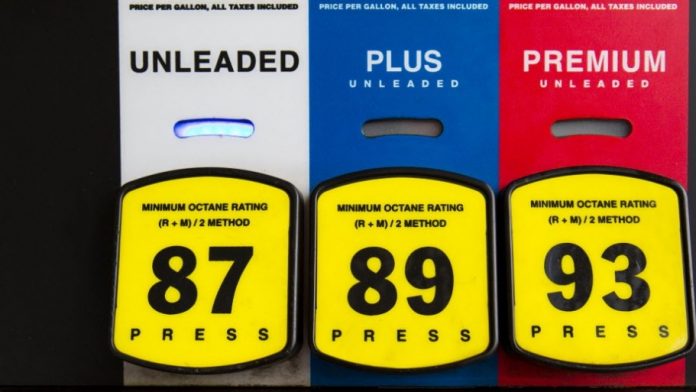









Apparently, our Masters know exactly what they’re doing with this plan.
Step one: Find a way to make driving more expensive for all;
Step two: Find a way of selling it to us, so that we don’t know what happened;
Step three: Get the older vehicles off the road, sooner than their expected lifetime;
Step four: Make it seem like a mandate is something done “for our own good.”
I’ll use the words of the Goober from Government Motors: The 95-octane mandate would boost overall gas mileage by up to 3 percent.
So, if a fleet of cars gets 30 miles per gallon, it will now get 30.9 miles per gallon.
Yet, we would pay 30 percent MORE per gallon of gas!
Doing the math, using my local fuel prices, I would now be able to drive an extra 9/10 mile on the gallon of gas, but it will cost me 90 cents more for that gallon. At 30 mpg and $3 a gallon, I’m paying 10 cents a mile for gas. At 30.9 mpg and $3.90 a gallon, I would then be paying 12.62 cents a mile for gas.
A 26% increase in cost, for 3% more efficiency!
That’s a sick joke.
To add yet another fly to the ointment, I would point out that weather/climate has a significant effect on how gasoline acts in engines on any given day. For example, when the air is very hot, say over 100 degrees F, and very dry, say 5-10 % relative humidity, all gasoline, no matter its octane number, *acts* in the engine like it is several octane points lower than the RON/MON average that is marked on the pump. When it is cold and damp, gasoline will act more like its labeled octane number; I presume that this is why one sees lower octanes more commonly in winter and in cold areas in general. I live in a hot desert, so use premium in the summer, even though the engine calls for regular.
What is the compression ratio cutoff between regular, midgrade and premium gasoline? I buy pure gas for my 1995 Honda VFR750, which runs 11:1 compression from the factory, but I have a colleague with a 2007 Lexus RX350, 10.8 compression and her manual recommends premium fuel, my wife’s 2003 RX300 runs fine on regular.
It depends on engine design but it’s around 12:1 or so I think. The Mazda3 SkyActive engines run 13:1 in Europe with their gas but have to be detuned to 12:1 to run on American Regular.
It also matters whether or not the engine is forced induction. Turbo- and super-chargers tend to work better with higher octane fuel, though they can sometimes be configured to run on regular.
Hi Ken,
There are variables; including an engine’s ability to dissipate heat. A given engine made out of aluminum (heads especially) can handle higher CR better than the same engine with iron heads.
You probably won’t hurt anything by using, say, 87 octane in an engine that “requires” premium – assuming it has knock sensors and can self-adjust for the lower-octane fuel. But I’d go with the the manufacturer recommendations, regardless.
There are too many variables to make a blanket fuel recommendation given only static compression ratio.
In addition to what Eric said you also need to consider chamber design (cylinder head), quench height, cam timing (a.k.a. dynamic compression), type of induction (i.e. efi vs carb vs direct injection vs na vs boosted), gearing, vehicle weight & intended use, and probably a dozen more factors I can’t think of right now.
What is needed is another revolt against government mandates. A number of years ago there was a huge debate as to whether the government can mandate something while forcing the states to pay for the mandate. Many states argued the government should pay for the mandates, not the states.
More insanity: The recent explosion of quad copters aka drones has led to a number, albeit small, of misuse of these toys so as to endanger commercial and private air traffic. The answer: more government. Force all drone users to register (I’m sure that will happen) and then
Some are suggesting that those who fly R/C planes as they have been doing so for the past 70 years, be required to take the current FAA exams and then purchase electronic ID and tracking devices for model airplanes. This is being hotly debated over at the website R/C groups. How some people believe the government getting involved only leads to good is beyond me. It seems some people just don’t get it. The idea of liberty completely escapes them. They only want the government to create even more havoc/laws as well as criminalizing anyone who does not comply. I’ve tried to explain to some of those clovers/statists that it will not work, will lead to more expensive gadgets and will also add more government as if the government isn’t big enough, more money wasted, more people on the government teat, and more debt. Some just don’t get it as they resort to ad hominem attacks because they cannot provide a logical rebuttal to my arguments.
Once Uncle gets involved with anything you can be sure it will regulate it to death. It doesn’t matter that it’s car or model airplanes, the outcome is always the same: more government and more debt.
I run pure gas in my car and my SUV. 89 octane. It’s not because I enjoy paying the extra 30-50 cents per gallon, but because I ‘m tired of replacing fuel pumps at several hundred dollars a crack in my 1998 Tahoe. When a small engine mechanic showed me what ‘regular’ ethanol gas was doing to the inside of my boat motor, I switched everything to pure gas. My small motors run better. My cars get better gas mileage (the 2008 VW gets 33+ miles per gallon on pure gas, but only about 30 MPG on ethanol gas). For me, I see no upside for higher ethanol content, only downside.
Hi Ron,
For those of us with older vehicles not optimized for ethanol, there is no upside. Mileage is less and (depending on the year of the vehicle) ethanol can and often does degrade components not specifically designed to handle the alcohol content of the “gas.”
The reasons it’s being pushed on us are several:
One, it’s a payday for the ethanol lobby.
Two, if an engine is designed for it (specifically, very high CR) you can get higher power and even a mileage benefit.
But the problem with that is the gains are negated by ethanol’s significantly higher cost. Also, the engines themselves cost more – both to manufacturer as well as to maintain over time.
In a way, it’s analogous to the EV dementia.
The touted “benefits” are obviously outweighed by numerous functional and economic disadvantages – yet these are ignored or downplayed by people who appear to be in the grip of a kind of mania that borders on religious fervor.
The reason I retired my straight 6 from my 1966 F100 was because I couldn’t get leaded gas without buying additives myself. I do use the fore-shits and heads and tails from my still in my 4-wheeler engines. I just mix them in with the gas that is in there. They seem to run fine on it.
Still missing the target: This is a good explanation of Octane and Ethanol, but not of the reason behind E15 or more. Yes, such adulterated fuel will destroy older vehicles and machinery. It will cause numerous problems even in newer cars and trucks. It will enrich the agricultural producers, who as a group bitch about certain segments of society getting government welfare payments.
The real reason we will be raped by government mandate, as in ALL other government market interventions, is to support the PONZI scheme being operated by the federal reserve system. Our money has been debauched by the same people, well documented in history, that have destroyed civilizations and cultures since they were thrown out of their temples for cheating as Money Changers.
Ethanol in our fuel just keeps the PONZI alive for a few more breaths…
Focus ST Can take regular fuel with only about a 10hp hit. The torque isn’t affected. It tempted me.
I was looking at a vw gti a few years ago. I decided against it because I know is cheap out and get the regular fuel and they suggest premium fuel, but no data on regular if fed.
There’s a gas station near me that sells no-ethanol gas because it’s on a snowmobile trail, and people who are running small engines that sit unused half the year or more HATE ethanol gas. I buy it sometimes for my motorcycles, particularly toward the end of the riding season when whatever’s in the tank is going to sit there all winter.
The no-ethanol fuel is about forty cents a gallon more than the ethanol stuff. What’s fucked up about the whole situation is that I’m paying for the ethanol through my taxes because of the Federal subsidies, so it’s not clear that the ethanol gas is truly cheaper — it just appears to be that way at the pump.
Hi X,
Whenever this issue comes up I always ask: If ethanol is such a boon, why must it be mandated?
In my area you can still get non ethanol gas, but it is premium 91 octane. This is only because a couple of years ago they shut down a pipeline that was bringing in 87 octane straight gas and now they pipe in 83 octane to blend with alcohol for an 87 octane finish. No way to get 91 octane from that gas without upping the alcohol content too far, so we get real 91 octane gasoline if we need it.
Here in Australia 91 octane is the lowest octane you can get. It is pure petrol. E10 has ethanol, using food for fuel to starve the population. I don’t know its octane rating as I do not use it. It’s 3 cents cheaper but costs 10% of your fuel economy. Next octane step is 94-95, then at the peak 97-98. As far as I know, no corn in them higha ratens!
Loved driving through Oklahoma and their <1% ethanol free gas. Glad to live in Houston as well that offers a lot of Corn-Subsidy free gas. How can they say ethanol is renwable or green since it subsidizes corn growers to overproduce and create monoculture fields? Oh, because it isn't, just a reason for the dupes to believe it.
Sometimes I sit and wonder…. given all the technology available these days….. how awesome cars would be in all respects…. were it not for constant government meddling in the matter….
Premium fuel usually has a better additive package with regards to detergents and so on.
Of course that is probably not needed every tank though.
So, with the exception of engines that are designed to ignite at lower compression, higher octane itself does not damage a car? It’s the ethanol that is harmful, it that right?
State mandating of high octane fuel boosted by enough ethanol to damage older cars is definitely a Bad Thing.
However, some newer cars are designed to run OK on regular but able to make more power if fed premium.
And worrying about some consumers voluntarily buying higher octane fuel “than they need” (even if their car cannot use the extra octane) does not seem to be the kind of issue that should concern a Libertarian. 😉
Hi Mike,
The higher octane won’t hurt anything, it’s just not optimum if the engine doesn’t require it. In the Old Days, use of lower-than-needed octane in a high compression engine could result in pre-ignition (“engine knock,” remember?) but in modern cars, the computer has knock sensors and dials back timing and so on to accommodate lower octane fuel.
Not all of them. And when you get down to it, designing in an allowance for lower octane fuel still means leaving some of the power available to higher octane fuel on the table, so to speak.
Hi NP,
Regular fuel engines are designed for regular fuel; there isn’t a “designed in allowance” for regular (and by implication, the engine would be more powerful/efficient if fed premium).
That’s the big issue here.
Until quite recently, the majority of passenger car/mass market vehicles came equipped with engines specifically designed for regular/87 octane fuel – not high octane premium. There are millions of these cars on the road and will be for many years to come. Forcing their owners to buy more costly high-octane fuel their cars do not need is an outrageous thing.
It is of a piece with forcing everyone to buy a “safe” (but overweight) car rather than leaving people free to choose light/economical ones, if that’s their wish.
Ethanol notwithstanding, here is the Tesla’s latest fatality.
https://www.youtube.com/watch?v=Tr-oF7J0cBw
I’m really baffled by the dip-shits who continue to praise this lethal piece of shit, and it’s CEO. Only a greedy, dickless, shitbag excuse for a human being would NOT be apologizing profusely to the entire driving public, not to mention recalling every one of those death-traps, while concurrently financially providing for every one of HIS victims in perpetuity! Anyone of US would have been prosecuted, and summarily executed, after the first fatality, but Musk? No, this shows the world what a billionaire MURDERER can get away with, SCOTT-FREE!
To all you “techno-worshiping milennials” who idolize this this prick and his fraudulent ass, please hurry up and be the next Tesla fatalities, because, apparently, no one will give a rat’s ass!
The guy who died was probably a huge fanboi anyway, natural selection working for once. If someone is stupid enough to pay 80 grand for one of these things, and trust the autopilot, then let them suffer the consequences. The problem of course is if you’re hit by one of these malfunctions or if we’re forced to drive them.
As for the clover below… why should the US have to match the standards of EU or anywhere else for gasoline/petrol? Yeah, the US desires the cheapest gas, I see no problem there… I do too. Change everything so that it would be easier for the globalists to make just one engine for everyone?? Change everything so that I have to give them more money for a new car? And then, they’ll change the goal-posts, why not an even higher octane in the future?
Actually, moving to higher octane fuel makes sense from a number of perspectives. The US has always been an outlier when it comes to fuel, other regions, in particular Europe, use a higher base octane rating for their “regular fuel” necessitating most car manufacturers to design their engines with two sets of specs, since Americans for the most part insist on putting the cheapest gas in their car. Moving the US to a higher base octane rating should make it easier and cheaper to design more efficient engines, since there will be less duplication of effort involved. Also, higher octane fuels do actually have more potential energy stored in them, provided (as you correctly point out) an engine is designed to properly extract that energy from it.
Unfortunately, this is a case where the market has been overridden by the stupid, and even though efforts have been made to introduce engines that will run well on 89, 91, or even 93 octane, people persist in putting in “regular.” And probably the only way to stop them is to make sure the cheapest “regular” is something other than it is today, which unfortunately will end up leaving behind a lot of older cars and engine designs.
Ethanol, on the other hand, should stay as corn. It’s more valuable that way.
Hi NP,
It isn’t “stupid” to use the correct octane for a given engine.
My standard rejoinder: Why force everyone to use 95? There are literally millions of cars on the road which do not need high octane fuel – and so spending 30-50 cents more per gallon is wasteful in that case.
And I am pretty certain this is a ploy to get more ethanol into the mix, too.
Not just more ethanol, but more of YOUR money into the pockets of the gov/ind complex, furthering the cause of debt slavery. Debt from a new car, more repairs to older cars, and from overly high fuel bills for mobile people who can’t depend on pubic transport to get them to and from work and the doctor’s office. More money for the insurance mafia as new cars attract higher premiums. More tax revenue for the government to enrich themselves at your expense.
What IS stupid is when people buy a car that requires premium fuel, and then put regular into it, because either they didn’t read the manual, didn’t listen to the salesman, or their spouse or kid is filling the tank instead of them, and THEY didn’t listen, because they figure gas is gas. That happens a lot more often than people putting too high an octane rating in their car, which is why many carmakers are gunshy about putting out cars here that require premium fuel (especially the warranty claims stemming from improper fueling).
Unfortunately, this is not a case where free market solutions will work all that well due to the situation. Octanes at the pump are set by regulation, not market forces, otherwise one might expect to see a natural shift to offering higher octane fuel as carmakers release higher compression engines in order to increase fuel efficiency. That fuel might even be a lower price than “regular” as demand increases. But since we have a currently dictated “base” gasoline rating, the industry is going to make sure it’s the cheapest, and ironically is also going to make sure it’s the most profitable for them as well, since, it being the lowest common denominator (and because some people just don’t RTFM) they’ll probably sell the most of it anyway.
Hi NP,
I agree with you that it’s not smart to put regular/low octane into a vehicle which needs high octane premium. But where we disagree is that I believe people have every right to be foolish, make decisions I don’t agree with – so long as they aren’t harming anyone else. Someone using regular in their car which was designed to burn premium doesn’t harm me – so it’s not my business, much less the government’s.
But forcing everyone to buy premium does harm people – those who own cars that were designed for regular. The fuel costs more and there is no benefit if the car’s engine can’t make use of it.
By way of analogy: It is foolish to be overweight and not exercise. But some people decide to be overweight and not exercise regardless. Should people be taxed for not exercising and being overweight?
Cars are one of those things where it’s very easy to harm someone else with one’s own decisions. If I don’t bother maintaining my brakes, I could hit that other guy and kill him, just as an example. So while in general I tend to be Libertarian on most issues, there does need to be a practicality line. Besides, requiring gas stations to carry regular leads to carmakers not wanting to design for premium, which impacts my ability to buy a car that uses premium gas for greater efficiency. 😉
And as you pointed out, putting premium in a car not designed for it doesn’t actually harm it. It’s just wasteful. Yes, it does increase fuel prices, but frankly it doesn’t have as much impact on fuel prices as the price of oil, which has just started shooting up again. That’s controlled by OPEC (another non-free-market actor) and not whether the US Government decides to use 89 octane as a base fuel rating or 91 octane (what Europe calls 95 octane if I recall the conversion correctly).
NP,
Come on.
Maintaining brakes is not even remotely comparable to using regular rather than premium. You are not harmed in any tangible way by this.
And if my car doesn’t need premium (2002 Nissan Frontier; regular fuel engine) forcing me to buy more expensive fuel does harm me. It is obnoxious in the extreme. 87 octane regular is on the market because there are millions of vehicles out there with engines designed to burn exactly that. High-octane premium is available, too – for those who don’t object to paying extra for it.
You argue that other people should be forced to subsidize what you think is preferable – by denying them the freedom to buy what they think is preferable.
It is the same argument used by the geeks who force-fed airbags to us.
Your position is as un-Libertarian as it gets.
Your argument is also that people should just leave things as you prefer them, so you might want to watch who you’re calling un-Libertarian there. Your argument isn’t to allow the free market to decide minimum octane ratings, it’s to maintain the current status quo so you can buy cheaper gas. Might want to go brush up some.
NP,
The difference is I am not advocating you be forced to buy regular – while you are advocating that I and others be forced to buy premium. That was the whole got-damned point of the column.
Can anyone read anymore?
Buy high octane gas if you need it; but leave the millions of us who don’t need it out of it. We don’t want to pay 30-50 cents more for a gallon of gas – in order to get the “benefits” of a 3-5 percent uptick in mileage. We prefer simpler/cheaper/ inherently more durable and lower-cost-to-buy and maintain engines without high compression and turbos, even if they do use a bit more gas.
My finger hovers over the Clover button…
Time to bring back Tetraethyl lead.
Hi NP,
Also: The high octane fuel is being pushed in order to push more small displacement/turbocharged/very high CR engines… as a way to meet the got-damned government’s fuel economy fatwas. But these are expensive engines. Fine in a performance car. But does a family car need a 12:1 CR 2.0 liter engine and/or a turbo? An engine that costs 20 percent more than a 3 liter V6 without the turbo (and high CR) that makes the same power . . . for the sake of a 3 percent increase in fuel economy?
It makes my teeth ache.
The question isn’t whether or not a family car “needs” that engine. When you ask if a family car really “needs” that engine you sound like the same liberal snowflakes who feel like they have the right to decide what other people “need.” Bottom line, if they WANT it and the market has made it available they should be able to GET it.
Np,
Sigh. As I have explained, these engines (and transmissions) are being put into family cars and so on not because of buyer demand but only and solely to comply with the fatwas.
There is no sound reason – from the standpoint of the buyer – for replacing, as an example, a naturally aspirated/regular gas V6 that makes 200 hp and averages 25 MPG with a turbo four that makes about the same power, gets maybe 4 MPG better mileage – but requires gas that costs 30-50 cents more per gallon and also costs significantly more to buy and maintain.
The turbo engine is more complex, has more parts – more things to wear out and cost money. Price a rebuilt turbo lately? With a naturally aspirated V6, you never have to worry about that. And you save money by not spending 30-50 cents extra per gallon for the gas.
Me thinks you are talking to a wall there Eric….not worth the aggravation.
Actually methinks Eric just got outed as an authoritarian when it suits him, and needs to cover for himself now.
Np,
Really? Can you read?
Jesus!
How is it “authoritarian” to advocate for free choice/voluntary interactions, as I have – as opposed to the forced/mandated things you advocate?
I’ve clearly/repeatedly stated that I have no issue with high octane fuel being available for those we need it/prefer it – and don’t object to paying more for it. If there is market demand, so be it!.
But regular/lower octane fuel should also be available, so long as there is demand for it. Clearly, there is demand for it. Millions of cars do not need high-octane premium.
Who the hell are you to take that choice away from people?
My article criticized the forced (by government mandate) elimination of choice; the forced standardization of high-octane premium.
You want regular to be mandated out of existence.
And you have the effrontery to call me the “authoritarian”!
This is classic Clover thinking. Of a piece with the dicks who think EVs ought to be mandated for the “greater good,” as they see it.
Christ, my teeth ache…
NP, premium is a “luxury” for performance. If every engine is re-designed or simply designed for premium, you will have a hard time finding the savings via mpg compared to cost at the pump.
This come from a guy who’s always built engines requiring premium. I never once claimed it saved money….since it didn’t. It was a way to extract the most power and that was the entire point. I’d have dropped the CR a couple points if I had been trying for mpg instead of the most power.
And along the lines of premium vs. regular, I’ve known countless(from friends who drive fuel trucks)retailers who simply don’t have pure premium and regularly have the delivery mixed going into their storage tanks. Rarely is gasoline tested for octane when the RR Commission of some other such “state” entity tests their pumps for accuracy.
If they really wanted efficiency they’d use #1 fuel and forget gasoline.
A decade ago when my cousin and I went to Mexico we’d be tooling along and smelling the exhaust from trucks(as well as my pickup) when we got out and left it idling). He said the exhaust smelled different from US diesel. I told him it was, that kerosene smell was #1 fuel instead of the regular #2 we get in the US.
There was a time when some truckstops sold #1 but it’s been a long while since I’ve seen it although it’s probably sold somewhere or at least it’s sold “as” #1. A bit pricier tank of #1 used to be a “tune-up” but rarely did I see anyone using #1 all the time.
BTW, the fuel in Mexico was more expensive than US fuel.
Octane is measured differently around the world. The US has settled on (R+M)/2 which results in a lower number than places that use RON. (research octane, the R in the US formula, the M is motor octane, a different method that yields a lower number)
Exactly. From looking at the comments in the linked article above, the 95 RON ‘premium’ is the same as 91 octane [(R+M)/2 method]. Apparently they want that to replace 87 octane as the lowest rating available at the pump.
The ethanol boogeyman is overhyped IMO, (beats dead horse here) I have run up to 40% ethanol in multiples of vehicles (including old school carbed setups) without a single issue (except for lower MPG). Then there are the racers I know that use the hell out of E98 without any trouble. If the internet ethanol alarmists were correct, there should be problems cropping up left and right, but they aren’t.
My work in the petroleum distribution industry leads me to think that a majority of the fuel system problems attributed to ethanol fuels actually stem from cheap assed station owners not keeping their tanks and lines leak free. Water in the tanks makes a hell of a mess and is fairly common. It’s the reason why I only buy fuel from places that I know will keep up with the system maintenace and not cut corners. FWIW, just because a station is part of a national chain (i.e. Shell/BP) is no guarantee that they take care of their stuff. Lots of ‘new american’ owners like to buy in to a chain and then cut every corner in the book. One nearby was selling 87 octane E10 at every dispenser, even the one labeled 91 octane no eth. He got away with it for years before getting caught.
There is also the ‘made in china/bangladesh/whereverthefuckistan’ inferior gasket materials that seem to show up all over small engines. Gasoline is a much more agressive solvent than ethanol. You can pour ethanol into a styrofoam or plastic cup and it won’t dissolve. Try the same thing with gasoline sometime.
Personally, IDGAF whether they want to increase ethanol usage at the pump or not. I just like the idea of inexpensive race fuel….
The wife’s car manual say “Do not use fuel with more than 5% ethanol”. I got some fuel that must have been some really high number, not the 10% posted on the pump. The fuel melted the plastic fitting on the fuel filter causing me to loose a tank of fuel going across town. I had to stop and open a gate and had gasoline(sic)all around the car when I got back in.
Once on a rack, the crap running out was clear as water and stunk to high heaven. Everybody in the place wanted to know what the hell that smell was. I caught some in a water bottle. A couple minutes later I saw the bottle was collapsing so I tossed it on the RR tracks out back. I let the tank run dry(easy, it was almost empty anyway) before installing a new inline filter. I have never had that problem since so that fuel was NOT what was described on the pump. I haven’t used HEB fuel since….and that was a decade ago.
Most likely it was MTBE, an industrial solvent sometimes also used as a fuel oxygenate. Nasty stuff…
I’ve worked in a lab with a few absolute alcohols and it didn’t smell like them. It melted hell out of plastic though, just like absolute would.
Toluene was a favorite of the small guys here in Oz during the 90s until a shipload of 20 million liters pulled up at a dock one day. The government was on quick as the total toluene consumption in the whole country was only 5 million liters a year. Turns out the small petrol station owners were diluting their fuel with toluene. And lots of engines were getting new seal jobs. So the government put a huge excise tax on toluene to eliminate the use of it in petrol, as well as sending the ship back to its source. So our epoxy resins made with toluene as a solvent shot up in price.
Ah, toluene, Moroso Octane Booster…just replete with it. Do some tuning in a closed building with the engine running and no outside exhaust, you could get some real funky feelings going.
I guy in my home town had a bidness making Meyers Manx dune buggy clones. He went out of bidness when he couldn’t get the resin to make them. It was a sad end to a cottage industry.
One of my buds had an aluminum Buick V6 he put in one. It would run like stink. Those were the good old days.
to5, gasoline is primarily made up of benzene, toluene, ethylbenzene, and xylene.
Typically, higher octane fuels contain a greater percentage of toluene (Shell VPower for instance). Your claim that it was being used to “dilute” fuel and is being discouraged for use in fuel by the Aussie govt. makes no sense at all since it is a primary constituent of pump gasoline. Smells like bullshit.
I’ve seen ethanol damage things.
More than once.
So NP – you think its a better idea to force everyone (including those on the borderline) to pay well over 100 dollars to fill a small tank of fuel in their cars like they do here in Europe??
Hi Nasir,
Until recently – past five years or so – most mass-production vehicles did not come with turbocharged/high-compression engines. It was a selling point to tout that the vehicle’s engine didn’t need premium fuel.
The per-gallon price difference between 87 octane regular and 90-plus octane premium is equivalent to the total current federal/state motor fuels tax burden. Put another way, forcing people to buy premium – as is being urged – amounts to doubling the tax burden on people who don’t need premium.
Instead of paying 50-something cents in taxes, they’ll pay $1 or more extra per gallon.
Previously, people got up in arms when a significant uptick in the motor fuels tax was suggested. This amounts to the same thing. I wonder whether there’ll be any serious opposition…
That’s one of the reasons why, when it was time for a new car, I chose one with a 6-cylinder non-turbo engine instead of a turbocharged 4-banger. Yes, I may get worse overall gas mileage with the 6, and some maintenance parts for the 6 are more expensive than the 4, but I don’t need to use premium gas, and I don’t have to worry about the possibility of the turbocharger breaking down, which is more costly than any other part of the engine to fix or replace, except maybe for the reciprocating assembly. So, although I may buy a bit more gasoline day-to-day, and pay a bit more at oil changes, etc. my overall costs over the long term life of the car are at least a wash and at most lower.
On top of that, the usable life of my car is likely to be longer because of the lower likelihood of engine breakdowns and expenses to repair them that exceed the value of the car. That’s because not only is there no turbocharger to fail and cost hundreds, or thousands, of dollars to repair or replace, but also because the non-turbo 6 is not running in a high state of stress, which means a lesser risk of failure in everything from the block to the valvetrain.
Trouble is, one may not have this option any day now.
Bryce, I can’t help but wonder why the turbo engines don’t need more oil. I understand they have(I hope)oil coolers but this was never a reason to use less oil on a turbo engine as far as I know.
Then again, I can only wonder if the engines are really made for longevity or it’s just a stop-gap sorta thing and they probably don’t have the internals for long life either.
I do realize some makers have a long history of building turbo engines and some have a very brief history of same. I won’t go into specifics but one maker at least has had a lot of problems….that really can’t be fixed without some revamping….which they don’t offer on their vehicles.
Having problems with condensate building in the charged air system? Hey, we’re working on that and maybe year after next it won’t be a problem.
I’ll believe all those turbo engines are good for the long haul in another decade….but I won’t bet on it since they’re already seeing reduced engine life. But hey, you should trade every couple years…..shouldn’t you? The sheeple just keep incurring increasing debt.
eric, not to change subjects….but let me change subjects. I read an article yesterday about your good ‘lectric car buddy’s company in which he said they did away with a lot of robots and conveyor belt system. According to the musker himself, Tesla will be into the black by the 3rd or 4th quarter of the year.
Meanwhile, economic analysts keep saying there’s no way to recover. Well, there is a method that could conceivably effect a recovery but my question is, “How much will it cost all of us?”. My other thought is I don’t want nor can I use such a vehicle. Up until a time when a model “T”(truck) is available with 4 WD, a one ton rear end and a bed, I really don’t see how I might benefit.
For one thing, I won’t be on this site saying how my husband just bought me a new $200K pickup and I “love it”.
Wrong. There are two octane ratings: the research octane number (RON) and the motor octane number (MON). In the US, we use the average of the two. In Europe, the use either RON or MON (I can’t remember which). There is a 8 to 12 octane number difference between RON and MON. You aren’t comparing apples to apples.